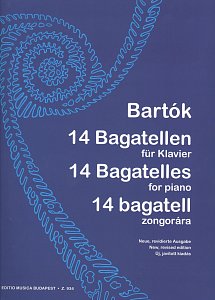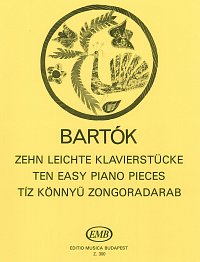BARTÓK: 14 Bagatelles for piano / 14 short pieces for intermediate pianists
| Publisher | EDITIO MUSICA BUDAPEST |
| Genre: | classical & sacret |
| Arrangement: | piano |
| Cast: | solo |
| Difficulty: |
Intermediate
Advanced |
| Format: | book |
Parameters
| Product code: | 934 |
| Composer: | Bartók, Béla |
| Author / Editor: | Bartók, Péter |
| No. of songs: | 14 |
| Pages: | 47 |
| Language: |
English
German Hungarian |
| Size: | 23 x 30 cm |
| EAN: | 9790080009345 |
| ISMN: | 979-0-080-00934-5 |
| Weight: | 164 g |
Songlist (14)
- Bagatelle I
- Bagatelle II
- Bagatelle III
- Bagatelle IV
- Bagatelle V
- Bagatelle VI
- Bagatelle VII
- Bagatelle VIII
- Bagatelle IX
- Bagatelle X
- Bagatelle XI
- Bagatelle XII
- Bagatelle XIII
- Bagatelle XIV - Valse
Product description
'This is one of Bartók's most famous series of piano pieces, whose fame is probably greater than either its popularity with pianists, or the frequency with which it occurs on concert programmes. When it was written [in 1908] it triggered sensation and scandal in musical circles. The series as a whole (its Hungarian title was originally 14 zongoradarab [14 piano pieces], Bartók later converting to the use of the word bagatelle in Hungarian too) is not a true cyclic composition that can only be played in its entirety and with movements in the original order, but rather a more loosely ordered collection, an anthology. Some of the pieces belong together. But the varied succession of tempos and characters, the 'Gradus ad Parnassum' principle, generally proceeding from the easier towards the technically or musically more difficult, could also be a reason for the volume's ordering.'
Béla Bartók (1881-1945), full name Béla Viktor János Bartók, was a Hungarian composer, pianist and and music scientist. He emigrated to the USA in 1940 because of his opposition to Hungarian fascism. Together with Leoš Janáček and Zoltán Kodály, he is one of the composers whose significant source of inspiration was folk music. He is considered one of the most important composers of the 20th century.






